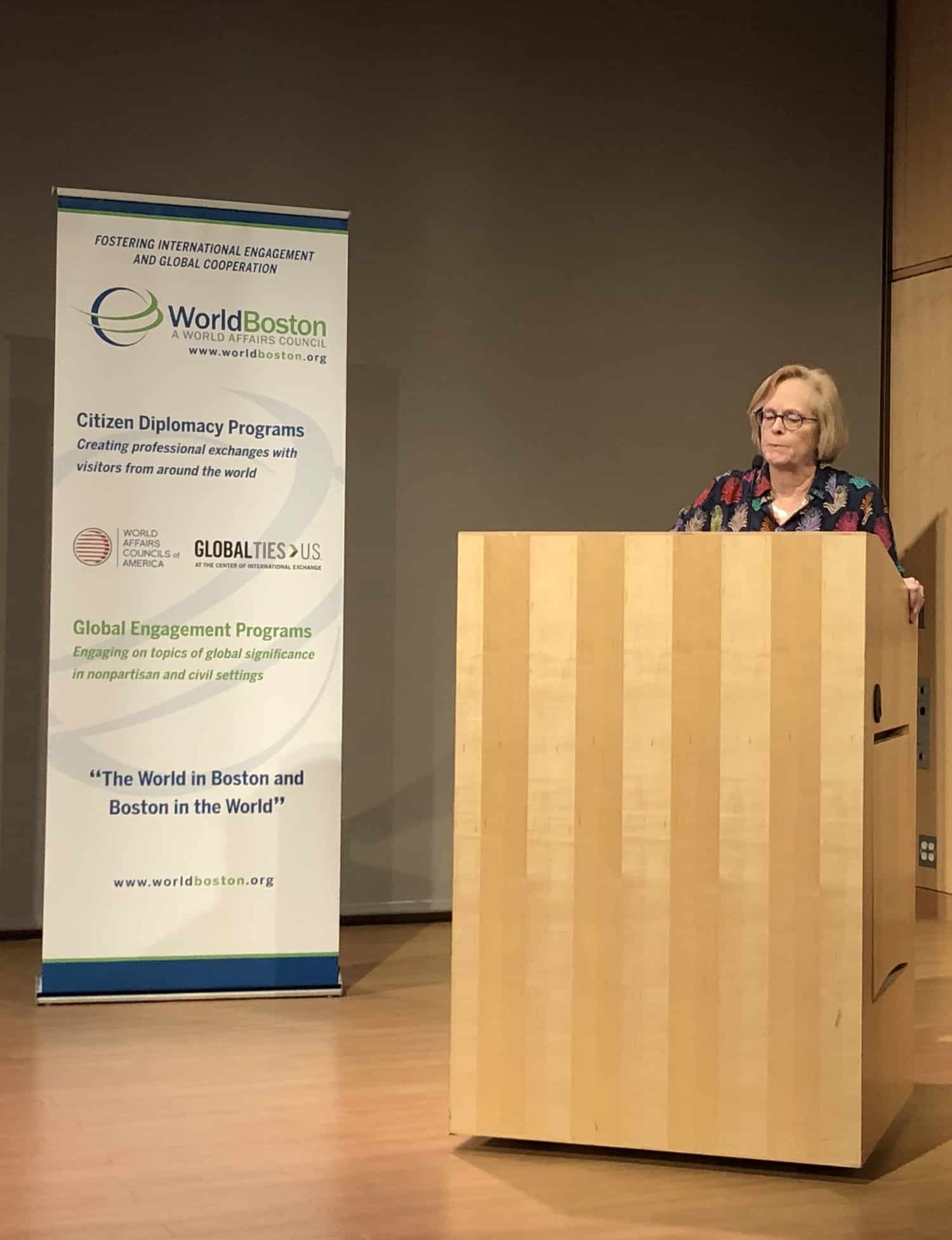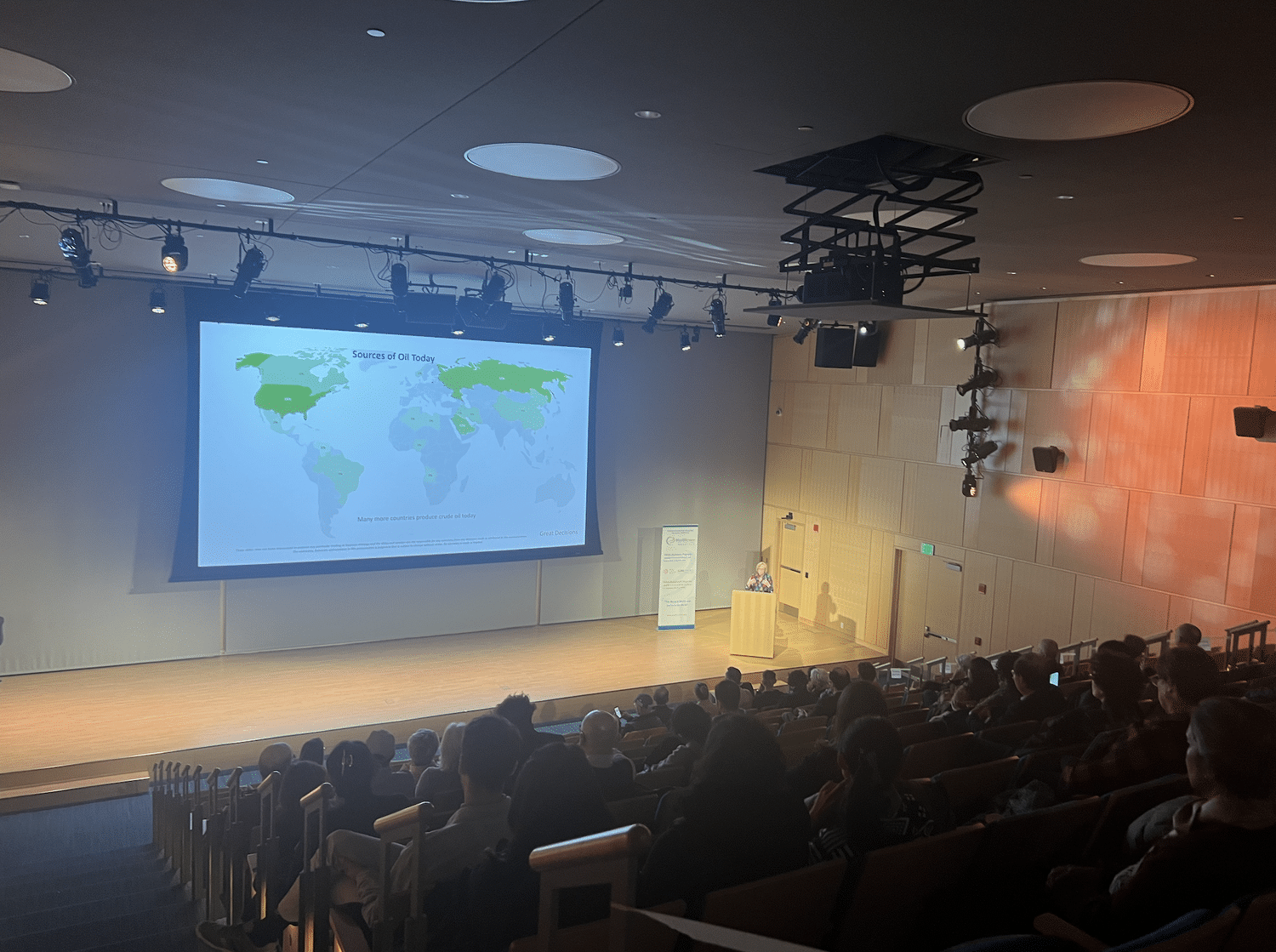
On December 13, Rabb Hall at the Boston Public Library was humming with geopolitical analysts and enthusiasts as WorldBoston welcomed Sarah Emerson, founder and President of Energy Security Analysis, Inc Energy (ESAI Energy) and Adjunct Professor at The Fletcher School at Tufts University for the final Great Decisions program of 2023. Professor Emerson has over 30 years of expertise in energy markets, where she focuses on the convergence of public policy, regulation, and markets; she gave an engaging talk on energy geopolitics from past to present for the first half of the session and fielded in-person and on-line Zoom questions from the audience. Professor Emerson grounded the discussion in defining energy geopolitics in relation to oil and petrol to be “stable, reliable and consistent” with energy goals as well as best practices in the realm aligning with: “cost effectiveness, sustainability, and humanitarian development”.
Historical Perspective/Practices: Lessons Learned
Oil Crisis
Starting in the 1960’s the largest oil producing countries that encompassed about 85% of oil production were as follows: U.S., Russia, Venezuela, and Arab Gulf states. At that time, there was no market system to counterbalance supply and demand as the major oil companies set prices and paid neither income nor excise taxes. With an historic image of gas lines, Professor Emerson highlighted the 1973 Oil Crisis, which had a large effect on the geopolitical landscape, with gas rationing in the United States due to the Arab oil embargo. This embargo was in response to U.S. aid to Israel in the Yom Kippur War in 1973, in which Egypt, Syria, and the Arab state coalition organized a surprise attack on Israel. Due to the United States siding with Israel, the Arab petroleum exporting countries placed a ban on sales to the US.

Professor Emerson discussed the factors at the time of the oil crisis and during the two decades prior: nationalization of oil companies and the role of the consuming governments. In the USA, the crisis resulted in action at both the federal and state level to promote growth of investment in the U.S. oil industry. Crude oil was rationed by states, and import quotas were imposed by the federal government. Of critical importance at the time was the fear of oil being cut off as demand soared. Unfortunately, fear turned to reality for the US, Europe, and Japan in 1973.
Oil Usage over the Last 50 years
Prof. Emerson showed a series of charts that focused on oil usage from 1965 to the present. The U.S., Europe, and Japan flattened the usage curve with the Organization for Economic Cooperation Development (OECD) response to the oil crises utilizing the following solutions: restraining demand, the Strategic Petroleum Reserve (SPR) and oil sharing system.
Current Concerns
Energy security remains a global problem. Oil, natural gas, and coal trends vary widely. With the Russian invasion of Ukraine in February of 2022, energy and natural gas have been affected both in price and availability (with Russia cutting off supply to Europe) due to economic sanctions placed on the former Soviet Union.
Trends show that oil, natural gas, and coal use are still rising in countries outside of the USA and Europe. Today, crude oil is produced in over 60 countries with the most monumental change from administered economy to market economy, which Prof. Emerson believes to be “the last great energy transition.” Additionally, according to Emerson, this direction in energy transition combined with carbon prices is a practical response of geopolitics safeguarding the trade of oil and liquified natural gas (LNG).
Economic sanctions have occurred in places like Iran, Russia, and Venezuela in response to geopolitical threats that pose danger. For example, Iran received sanctions to decrease nuclear weapons/threat of terrorism; however, Iran is a major exporter of crude oil to China. Russia also exports to China, India, Turkey, and Bulgaria; it was penalized by the US due to the Ukrainian invasion. Additionally, Venezuela though still importing to the US, has also been sanctioned due to corruption and still heavily exports to China.
Next Steps/Takeaways with Audience Questions
Implications for energy transition moving forward are seen with mineral usage. Professor Emerson focused on critical minerals for batteries such as lithium nickel manganese cobalt (NMC) which represents “60% of global market share” used for car batteries. Cobalt, specifically, has high energy density contributing to longer vehicle range. There are concerns with battery chemistry according to Emerson: “cost, range and mineral sourcing”. Most especially due to safety and child labor laws in places like the Congo, which procures cobalt, it is a humanitarian concern too. To address these concerns, the Inflation Reduction Out (IRA) in conjunction with President Biden has sought for production to be centered in the US.
Prof. Emerson recommended several steps to maintain energy dependability with transparency throughout and an understanding of the lessons learned through former crises. These include growing and preserving response plans, transforming energy sources, conserving a reliable energy framework to promote healthy energy markets that can withstand potential disturbances.
To close the event, Professor Emerson responded to questions ranging from fossil fuels to federal drilling.
On fossil fuels and lessons for the next generation, “We need to build a supply chain internally or with ally countries,” she said. Further on China’s use of coal, Professor Emerson relayed that the usage is cresting, and renewable expansion shows commitment. Additionally, Professor Emerson commented, “Energy transition is industrial policy,” and “build-up of consumption renewables” takes time.
Net Zero was the final topic of inquiry, given the recent Conference of the Parties (COP28) and public declaration of such by 2050. Professor Emerson proposed a sequential approach in response to a question on federal drilling, “We need to look at how we are making renewables, consuming, and incentivizing vehicles. We need to decide what we want to do in the next five years instead of a grand vision of 2050 that is faraway.”


